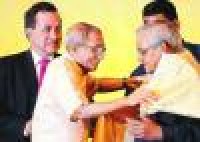Remembering G Kasturi
A correspondent, however lowly, could call him up at home. Preferably before 9 am.
If a message was left, a return call was as certain as the sun rising in the east, says MAHESH VIJAPURKAR. Photo: Thehindu.com

You knew he was on the phone, if upon picking it up, the conversation started with "I say!" That was his signature tune.
A correspondent, however lowly, could call him up at home. Preferably before 9 am. If a message was left, a return call was as certain as the sun rising in the east. Those who visited Chennai on personal trips too could get an audience and a long chat. All one had to do was wait for him to complete the most important business of the day, normally within the hour. No appointments were made. "I say, you are staff!".
Kasturi would take a tour of the editorial offices once a while in the head office, Chennai. He would see a whole lot of reporters lounging around - these were before the days computers facilitated play of Free Cell - between their assignments. He would ask them to "go out and understand, feel, get a sense of what is happening around".
Next day onward, there would hardly be a reporter around and getting them would be a hassle; the cell phones were yet to come on the scene. Then would come the word - "I say, some one should be around." And lo! everybody would be back to lounging around. This was a kind of game of the mice scurrying in and out.
One principle was that either he or his news editor should speak to the outstation correspondents periodically and get an idea to what was ahead. These calls were long - upto 30 minutes. A correspondent needed to have a plan of stories for 3-4 days; if he called and said, what are you up to and you mumbled, you had it: a stern but brief comment.
I had, when based in Ahmedabad, made a trip to Jaipur and two more to Jodhpur. He called up and asked what was happening in those places. On being told that the story was about ID cards for border areas but that it could not be wrapped up because the BSF and State Intelligence were cagey, he said, "Try once more. If it appears not possible, look for something else. Don't write a copy because you spent some money. Don't stop spending because you stories are elusive. You find the mean."
He was a stickler for accuracy. During the 1985 Ahmedabad riots - part of communal and part anti-reservation, he called up and asked how I distinguish between the two, specifying how many died/hurt in a communal flare up and a quota stir incident. Other papers don't draw such distinctions, he pointed out. I pointed out that after the press conference normally addressed by DG Police and Chief Secretary who just mentioned total causalities, they would disaggregate the numbers for me. Were they reliable? Had they proven trustworthy in the past? If so, go ahead, or stick to the official version and avoid the off-the record briefs as inputs, he said.
Often, he would call up and ask that a photograph from an agency which lacked detailed captions, be explained. He flabbergasted S Kothandaraman, Chief Photographer who travelled the world with cricket teams, by pointing out that a particular picture from the archives was taken at a specific time. When asked how he knew, Kasturi said, the stadium's alignment was in a particular north-south way and the shadow gave away the timing.
And printing technology was his passion. He would fly in to Hyderabad where a new press had been set up in 1970s and suddenly decide to go and print that night's edition. Spotting the flaws in the equipment etc., he would leave an oral list of things to do and expect a compliance report by the evening.
He led his life his way. He would have the IDBI’s (before it became a commercial bank) S S Nadkarni, visiting him at the guest flat at Kasturi Buildings, Mumbai and have long chats with him on a background basis. Once he had Nadkarni in at 8.30 and suggested 'lunch' which Nadkarni assumed meant another visit. What Kasturi had in mind was 'sapad' - the southern meal at 9 - 9.30 am. ! pm was coffee and 3.30 the tiffin time. It took some time for it to sink into Nadkarni that another dietary schedule existed in the world.
His advice to anyone among the staff affected by a family issue - alcohol, divorce, bereavement etc - was 'work, that alone would give you solace'. When he walked on to the stage for the 125th anniversary in Chennai with Vajpayee the chief guest, the applause –a standing ovation-- brought the roof down. Those who were not aligned with him since the 1991 Bofors-Ram episode were stunned to see the staff's affection for him.
During the spat with N Ram in 1989 on the Bofors stories, Ram had gone public with statements. Kasturi did not personally respond to them except informally appointing K Narayanan, the then news editor (later associate editor, consultant and Reader's Editor) as a spokesperson who provided brief responses only when asked.
I recall asking Kasturi during one of his visits around that time to Mumbai as to why did not put across his side vigorously by talking to journalists. He said that what his paper said or did not say was his version. By talking to others, he would not let the world think his paper was inadequately dealing with the subject. After all, the paper carried his name in the imprint line!